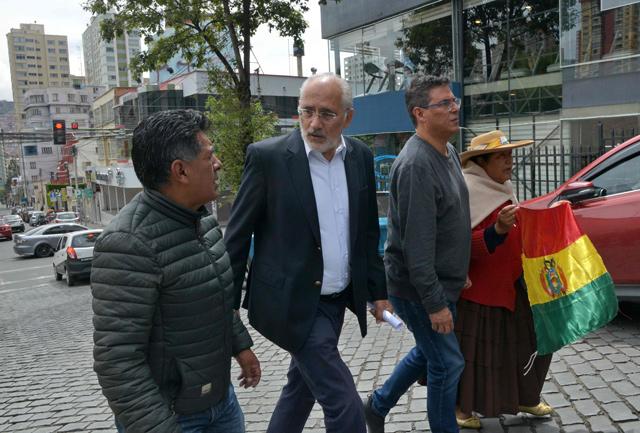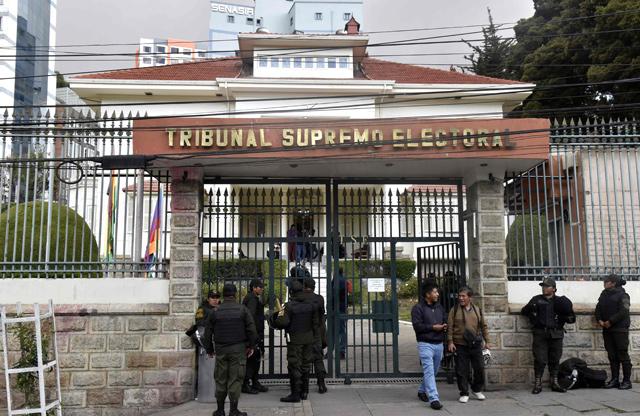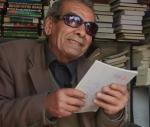You are here
Bolivian president says he will call new elections
By AFP - Nov 10,2019 - Last updated at Nov 10,2019

The opposition runner-up in Bolivia’s recent polls, Carlos Mesa (second left), leaves Avaroa de La Paz Square in La Paz after speaking to the press on Sunday (AFP photo)
LA PAZ — Bolivian President Evo Morales called new elections on Sunday, bowing to demands to do so after an Organisation of American States (OAS) audit found serious “irregularities” in elections last month that gave the leftist leader a fourth term but set off deadly protests.
In a television address, Morales said he would “call for new national elections, which, by voting, allow the Bolivian people to democratically elect new authorities”.
The country’s Supreme Electoral Tribunal would be replaced, he said, meeting a key demand of opposition leaders who had accused its members of rigging the count in the October 20 elections in Morales’ favour.
Morales, Bolivia’s first president of indigenous descent, did not say whether he would run again.
Carlos Mesa, the centrist candidate who came in second in the disputed elections, said Morales should resign “if he has a speck of patriotism left”.
The leader of a protest movement, Luis Fernando Camacho, said Morales “has fractured the constitutional order and must resign”.
In Washington, the top diplomat for Latin America, Michael Kozak, urged the OAS to send a full mission to Bolivia “to ensure new elections are free and fair, and reflect the will of the Bolivian people”.
Irregularities found
The head of the OAS, Luis Almagro, said the results giving the leftist leader a first-round victory and a fourth term in office “must be annulled and the electoral process must begin again”.
An OAS expert team found “irregularities that range from serious to indicative”, in virtually every area they reviewed — in the technology used, the chain of custody of ballots, the integrity of the count, and statistical projections.
“This leads the technical auditing team to question the integrity of the election results,” the report on their preliminary findings said.
The October 20 results showed Morales, in office since 2006, defeating Mesa by slightly over 10 points, just enough to ensure an outright first-round victory.
The OAS report said “the manipulations of the informatic system are of such magnitude that they should be thoroughly investigated by the Bolivian state to get to the bottom of them and determine responsibilities in this serious case”.
It is possible that Morales came in first place in the first round but is “statistically improbable” that he obtained the 10 per cent margin of victory needed to avoid a second round, it said.
Police rebellion
The dramatic turnabout came two days after police in three cities joined anti-government protests and a day after the opposition rejected Morales’ appeal for urgent, open-ended dialogue.
Three people have died and more than 250 have been injured in often violent protests since Morales claimed to have won a fourth consecutive term in last month’s poll.
Morales said that in the new elections “the Bolivian people will be able to democratically elect new authorities, incorporating new political actors”.
That begged the question whether Morales would stand again for reelection, a source of controversy because Bolivia’s constitution, which he promulgated himself a decade ago, limits presidents to two terms.
The civic committees that helped propel the protests had called on both Morales and Mesa to step aside in new elections.
Morales said Bolivia’s bicameral legislature, which his party controls, would meet in the coming hours for the parties to work out procedures for changing out the electoral tribunal.
“After this decision, I want to lower the tension. Everyone has an obligation to bring peace to Bolivia,” he said.
In the Vatican, Pope Francis on Sunday exhorted Bolivians to await the full results of the OAS audit with “peace and serenity”.
Cuba called on the international community to condemn the protests against its close ally Morales as an attempted coup by “imperialism and the oligarchy”.
The protests against Morales erupted the day after he was declared the first round winner of the elections, beginning in the opposition stronghold of Santa Cruz and spreading to La Paz and other cities.
On Saturday, opposition demonstrators overran two state-run media outlets and forced them off the air, while some police stopped guarding the square where Morales’ presidential palace is located.
An elite police tactical operations unit called UTOP rebelled on Friday in the central city of Cochabamba. The rebellion then spread to units in Sucre, the constitutional capital, and Santa Cruz, a bastion of opposition strength in the east.
That night the rebellion reached other cities but mostly spared La Paz, the country’s administrative capital, local media reported.
Related Articles
LA PAZ — Bolivia’s Congress approved a bill on Saturday that opens the door to new elections without ex-president Evo Morales, as the careta
LA PAZ — Polls opened in Bolivia on Sunday with Evo Morales vying for a controversial fourth term as the country’s first indigenous presiden
LA PAZ — Bolivia's electoral tribunal concluded its count of general election votes on Friday and confirmed the controversial reelection of

















